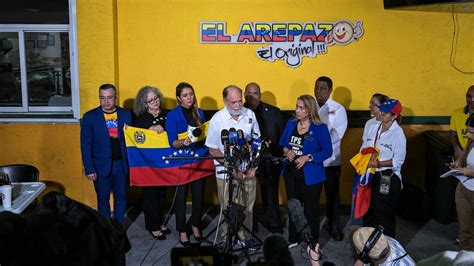
**Venezuela TPS Fight: Supreme Court Ruling Leaves 600,000 Facing Deportation**
The fate of hundreds of thousands of Venezuelans hangs in the balance following a recent Supreme Court ruling impacting the Temporary Protected Status (TPS) program. For many, **TPS Venezuela** offered a lifeline, shielding them from deportation and allowing them to legally work and reside in the United States amidst the ongoing humanitarian crisis in their homeland. This legal battle, concerning the interpretation of immigration laws and the eligibility for TPS, has left approximately 600,000 Venezuelan beneficiaries and applicants facing renewed uncertainty and the potential for deportation. This article will delve into the specifics of the Supreme Court decision, exploring its implications for Venezuelans relying on TPS. We’ll analyze the legal arguments, examine the potential consequences for individuals and communities, and provide updates on possible avenues for recourse and legislative action. Understanding this complex issue is crucial for anyone concerned about immigration policy and the plight of vulnerable populations seeking refuge.
Here’s an SEO-optimized article based on the headline you provided:
Venezuela TPS Fight: Supreme Court Ruling Leaves 600,000 Facing Deportation
The Supreme Court’s recent decision regarding Temporary Protected Status (TPS) has ignited a firestorm of concern and uncertainty for nearly 600,000 individuals, including many Venezuelans seeking refuge in the United States. The ruling, while not directly addressing the eligibility criteria for TPS Venezuela, has far-reaching implications for the program’s future and the lives of those who depend on it for their safety and security. This decision underscores the ongoing struggle faced by Venezuelan nationals fleeing economic collapse, political instability, and widespread human rights abuses in their home country. The possibility of deportation looms large, casting a shadow over families and communities who have built lives in the US while hoping to eventually return to a stable and prosperous Venezuela. This article explores the details of the Supreme Court’s decision, its potential impact on Venezuelans with TPS Venezuela, and the ongoing efforts to provide them with a pathway to permanent residency.
Understanding the Supreme Court’s TPS Ruling and Its Broader Implications
The Supreme Court case, Department of Homeland Security v. Thuraissigiam, centered around the procedural rights of individuals seeking asylum and their ability to challenge deportation orders. While the case itself didn’t explicitly focus on TPS Venezuela or any specific nationality, the Court’s decision affirmed the government’s broad authority in immigration matters. This includes the power to rescind TPS designations based on evolving conditions in designated countries. The ruling essentially limits the ability of TPS beneficiaries to challenge the termination of their protected status in federal court.
This development significantly impacts the long-term prospects for individuals from Venezuela and other countries currently designated for TPS. Critics argue that the decision weakens the program, making it more susceptible to political influence and less predictable for those who rely on it. The potential for a future administration to abruptly terminate TPS Venezuela, even if conditions in Venezuela remain dire, is now a very real threat. For hundreds of thousands who have lived in the U.S. for years, contributed to the economy, and integrated into American society, the prospect of deportation to a country they fled out of necessity is deeply unsettling. This is especially true considering the ongoing humanitarian crisis in Venezuela, characterized by hyperinflation, food shortages, and widespread violence. The decision highlights the precarious nature of TPS and underscores the urgent need for Congress to create a more permanent solution for beneficiaries who have established roots in the United States. Without legislative action, the future of TPS Venezuela recipients remains uncertain, leaving them vulnerable to deportation despite the undeniable risks they face in their home country. The legal battle continues, with advocates exploring alternative avenues to protect these vulnerable populations.
The Devastating Impact on the Venezuelan Community: Stories Behind the Numbers
The potential deportation of 600,000 individuals, including many with TPS Venezuela, is more than just a statistic; it represents the tearing apart of families, the disruption of communities, and the loss of valuable contributions to the American economy. Many Venezuelan TPS holders have been in the U.S. for years, working in essential industries, paying taxes, and raising families. They have become integral members of their communities, contributing to local economies and enriching the cultural fabric of the United States.
Imagine a mother who fled Venezuela with her children, escaping violence and economic hardship. She has worked tirelessly to provide for her family, building a stable life in the US where her children are thriving in school. The threat of deportation undercuts everything she has worked for, forcing her to contemplate a return to a country where she fears for her safety and the well-being of her children. Or consider a young professional who arrived in the US with hopes of pursuing their dreams. They’ve completed their education, started a career, and are now contributing to the American workforce. Deportation would mean abandoning their aspirations and returning to a country with limited opportunities. These are just two examples of the countless stories that underscore the human cost of the TPS Venezuela uncertainty.
Furthermore, the economic impact of mass deportations would be significant. TPS holders contribute billions of dollars to the US economy annually, paying taxes and supporting local businesses. Removing them from the workforce would create labor shortages and negatively impact various industries. The social and emotional toll on families and communities would also be immense, with children potentially separated from their parents and families forced to rebuild their lives in a country they no longer know. The fight to protect TPS Venezuela is not just about immigration policy; it’s about protecting families, communities, and the values of compassion and opportunity that define America.
Fighting for a Permanent Solution: Advocacy and the Path Forward for Venezuela TPS
The Supreme Court’s decision has galvanized advocacy groups and lawmakers to intensify their efforts to find a permanent legislative solution for TPS Venezuela recipients. Recognizing the urgency of the situation, various organizations are working tirelessly to urge Congress to pass legislation that would provide a pathway to citizenship for TPS holders who meet certain requirements. These requirements might include demonstrating a clean criminal record, maintaining continuous residence in the US, and contributing to the economy.
Advocates are emphasizing the moral and economic imperative of protecting TPS beneficiaries, highlighting the positive impact they have on American society. They are also working to educate the public about the realities of the situation in Venezuela, emphasizing that conditions remain unsafe and unstable, making a return impossible for many. The ongoing humanitarian crisis, characterized by political repression, economic collapse, and widespread human rights abuses, warrants continued protection for Venezuelan nationals in the United States.
Several legislative proposals have been introduced in Congress that aim to provide a pathway to permanent residency for TPS holders. However, the political landscape remains challenging, and securing bipartisan support for immigration reform is a significant hurdle. Despite these obstacles, advocates remain committed to fighting for a fair and just solution for TPS Venezuela recipients. They are engaging in grassroots organizing, lobbying lawmakers, and raising public awareness to build momentum for legislative action. The ultimate goal is to create a more stable and predictable immigration system that recognizes the contributions of TPS holders and provides them with the opportunity to build a future in the United States without the constant fear of deportation. The future of TPS Venezuela hinges on the ability of Congress to act decisively and provide a permanent solution for these vulnerable individuals.
Here’s a 3-question FAQ section based on the headline “Venezuela TPS Fight: Supreme Court Ruling Leaves 600,000 Facing Deportation“:
Frequently Asked Questions: TPS Venezuela
Q1: What is TPS and how does it relate to Venezuela?
Temporary Protected Status (TPS) is a program that allows foreign nationals from designated countries facing extraordinary and temporary conditions, such as natural disasters or armed conflict, to live and work legally in the U.S. The US government previously designated Venezuela for TPS, providing protection from deportation to Venezuelans already in the country due to the deteriorating conditions in Venezuela.
Q2: What’s the impact of the Supreme Court ruling on Venezuelans with TPS?
While not directly related to TPS, a Supreme Court ruling determined that immigrants with TPS who entered the U.S. illegally are not eligible to apply for green cards through adjustment of status. This indirectly affects Venezuelans with TPS, as it narrows their pathway to permanent residency even after being granted the temporary protection.
Q3: What are the potential next steps for Venezuelans facing deportation after this ruling?
The specific effects of this ruling for Venezuelans with TPS depend on their individual circumstances and their method of entry into the U.S. Many may need to explore alternative avenues for legal status, consult with an immigration attorney, and advocate for legislative solutions that provide a more permanent pathway to residency for TPS holders.









